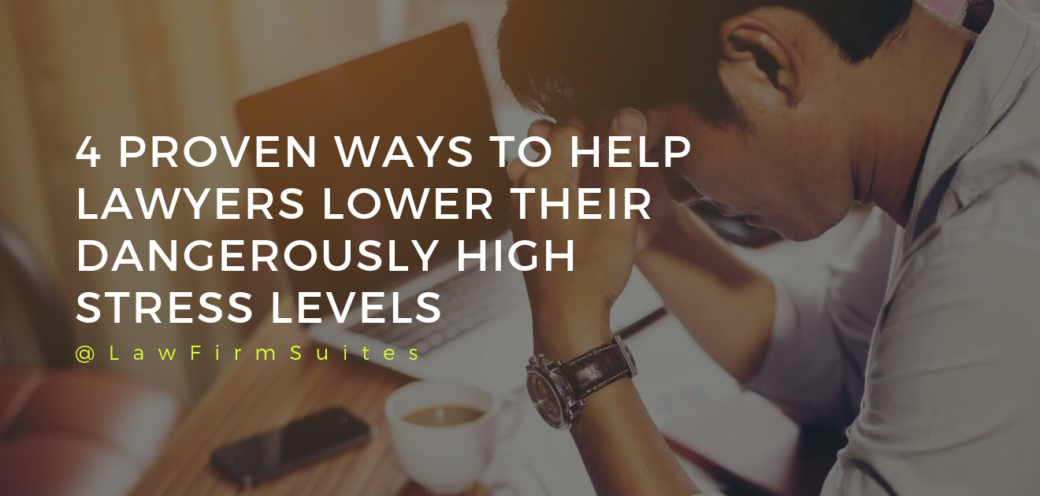There are several things you can do to help lower your stress that comes with being a busy and successful lawyer.
The stress that comes with running a solo or small law firm can push anyone to their absolute limit. The work demands of successful attorney are among the highest of any profession. When you factor in your daily commute and getting ready in the morning, how much time does that leave you for yourself?
Some lawyers are working anywhere from 70 to 80 hours per week every week just to meet their billable hour minimums which can range between 1700 and 2300 hours a year. Which means it should come as no surprise to learn that lawyers are incredibly stressed out.
Lawyers suffer from depression at a much higher rate than the general population, nearly 4x as likely as the general population (that number is more than likely higher for Biglaw attorneys). And as a result, practicing law is now considered one of the top 10 most stressful careers.
This stress has also led lawyers to higher chances of leading other unhealthy lifestyle choices. For example, a study conducted by the American Bar Association and Hazelden Betty Ford Foundation revealed that 36 percent of lawyers engage in hazardous drinking or possible alcohol dependence.
There are many different opinions out there explaining why lawyers have higher stress levels, but the one common denominator is simply that lawyers have a lot to worry about.
There are several things you can do to help lower stress that comes with being a busy and successful lawyer.
1. Create a Yearly Plan
For a lot of us, stress comes from not knowing what’s next. Lower stress by creating a detailed plan. The plan should include managing your health and priorities at work. Some of the health tasks can include getting more sleep, eating healthier, planning trips and spending more time with family and friends. Even with these every day takes, write them down! It will help you to stay accountable and encourage you to make new plans after the fact.
2. Zzz
It isn’t a secret that stress affects health and productivity, and there’s no shortage of it in small firm practice.
The 60+ hour work weeks add up and take a toll. The adversarial nature of the work can be toxic, and there’s constantly a lot on the line.
Plus, many attorneys try to give up some hours of sleep time to catch up with personal time in the evening. Terrible idea. Not only is this bad for your mental health, but it also slowly deteriorates your physical health and affects your productivity the next day.
According to psychiatrist John J. Ratey, getting eight hours and 15 minutes of sleep every night might be the most important part of staying healthy. Dr. Ratey is an associate clinical professor of psychiatry at Harvard Medical School and has written several books on exercise.
Even if eight hours of sleep is not possible, any additional sleep you get will have a positive impact.
3. Exercise
The confidence and the jolt you get from just walking into the gym and doing something active will change your day drastically. We all know that making time for exercise is far easier said than done, but if you can make it into a habit and carve out the time, then you will see a difference in your stress level. Exercising is proven to help combat anxiety by releasing serotonin and endorphins, which will also help you sleep better at night. Changing your lifestyle is challenging. But finding an exercise that you enjoy can make it easier to keep up with.
4. Put Extra Emphasis On Your Mental Workspace
Controlling your mental workspace can be one of the most difficult things when trying to lower and combat stress. But if you can dictate what takes of your mental workspace, then you can also better control your time, which will have a direct effect on your stress levels as a solo or small firm attorney. While modern technology does make it easier to handle some aspects of running a small law firm, it also adds considerable opportunities for distraction.
One of the best tips to help control your mental workspace is to break the habit of constantly checking your email. Schedule a certain amount of time every day to check your email. Avoid the temptation of checking it multiple times during the day. Each time you stop to check your email, you lose work momentum and your work schedule is shifted slightly. And next thing you know, your whole day is thrown out of whack.


